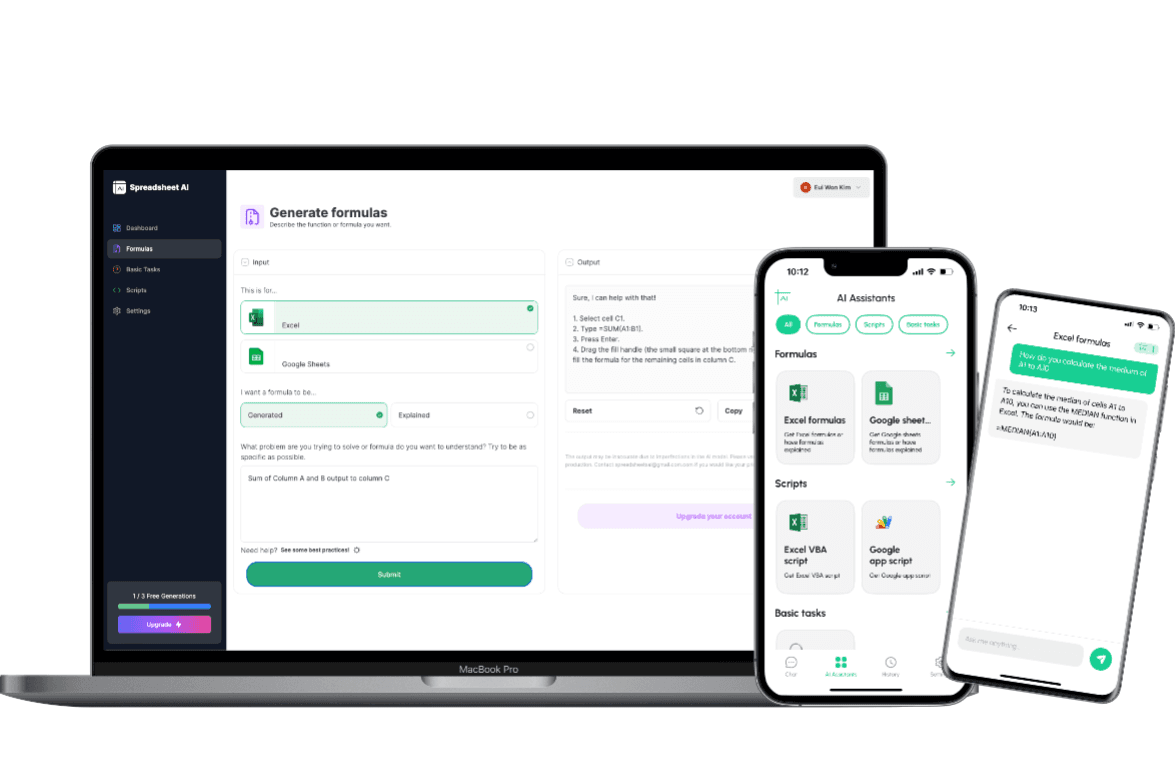Formula generator for PERMUTATIONA FUNCTION function
AI Excel Bot is your ultimate companion for generating and comprehending Excel and Google Sheets formulas. With its advanced capabilities, it goes beyond the basics by providing support for VBA and custom tasks. Let AI Excel Bot empower you to unlock the full potential of these spreadsheet platforms.
Formula generator
Spreadsheet AI is the #1 AI for generating and comprehending Excel and Google Sheets formulas. With its advanced capabilities, it goes beyond the basics by providing support for VBA and custom tasks. Streamline your spreadsheet with Spreadshee AI

How to generate an PERMUTATIONA FUNCTION formula using AI.
To obtain information on the ARRAY_CONSTRAIN formula, you could ask the AI chatbot the following question: “ To obtain the PERMUTATIONA formula from an AI chatbot, you could ask something like: "What is the formula to calculate the number of permutations in Excel, considering all possible repetitions?"”
PERMUTATIONA FUNCTION formula syntax
The PERMUTATIONA function in Excel calculates the number of permutations for a given set of objects, including repetitions. The syntax for PERMUTATIONA is: PERMUTATIONA(number, [number_chosen]) - number: This is the total number of objects available for permutation. - number_chosen: (optional) This is the number of objects to be chosen for each permutation. If not specified, it defaults to the value of number. The PERMUTATIONA function returns the total number of permutations as a result.
Use Cases & Examples
In these use cases, we use the PERMUTATIONA function to calculate the number of permutations for a given set of objects or values. The PERMUTATIONA function is particularly useful when we need to determine the number of possible arrangements of a certain number of objects or values taken from a larger set.
Calculating the number of permutations
Description
In this use case, we use the PERMUTATIONA function to calculate the number of permutations for selecting a group of objects (with replacement) from a total number of objects.
Result
PERMUTATIONA(number, number_chosen)
Calculating the number of permutations with constraints
Description
In this use case, we use the PERMUTATIONA function to calculate the number of permutations for selecting a group of objects (with replacement) from a total number of objects, considering certain constraints.
Result
PERMUTATIONA(number, number_chosen)
Calculating the number of permutations with additional conditions
Description
In this use case, we use the PERMUTATIONA function to calculate the number of permutations for selecting a group of objects (with replacement) from a total number of objects, taking into account additional conditions.
Result
PERMUTATIONA(number, number_chosen)
AI tips
Enhance Your Excel Efficiency with AI Tips: Discover our innovative Excel add-in feature, ‘AI Tips.’ Streamline your workflow and boost productivity as AI-powered suggestions offer real-time insights for optimal spreadsheet organization, data analysis, and visualization. Elevate your Excel experience with intelligent recommendations tailored to your unique needs, helping you work smarter and achieve more.
Provide Clear Context
When describing your requirements to the AI, provide clear and concise context about the data you have, the specific task you want to accomplish, and any relevant constraints or conditions. This helps the AI understand the problem accurately.
Include Key Details
Include important details such as column names, data ranges, and specific criteria that need to be considered in the formula. The more precise and specific you are, the better the AI can generate an appropriate formula.
Use Examples
If possible, provide examples or sample data to illustrate the desired outcome. This can help the AI better understand the pattern or logic you are looking for in the formula.
Mention Desired Functionality
Clearly articulate the functionality you want the formula to achieve. Specify if you are looking for lookups, calculations, aggregations, or any other specific operations.